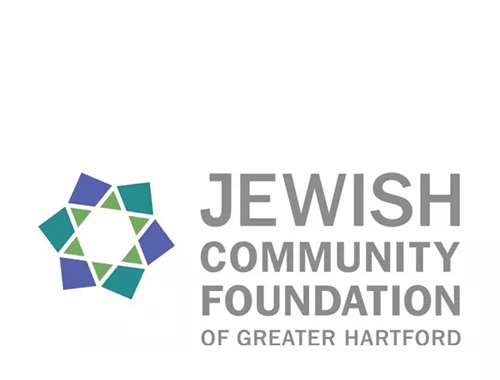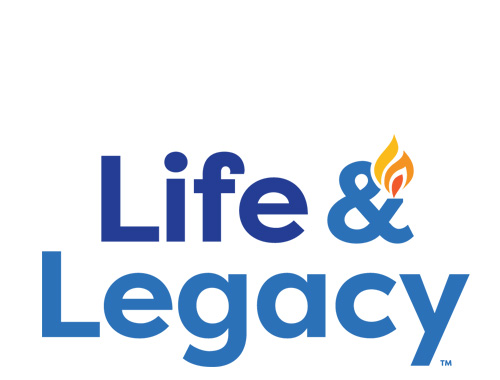Schechter Shavua: May 12, 2023
Shorashim Alef Studies Plants by Repurposing
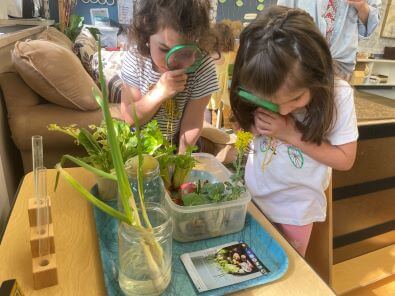 The Shorashim Alef students (EC3-4) have been immersed in the science of plant life thanks to an unusual source: discarded organic vegetables! Thanks to a generous donation from Whole Foods of vegetables that were nearing the end of their shelf life, these Early Childhood students created a kitchen scrap garden. Teachers Robin and Joanne trimmed the veggies down, keeping the roots intact. They placed the veggies in water by a sunny spot in the window, and have been making observations about the plants over time as some of the vegetables flourished while others did not. They noticed that the bok choy is flowering, the scallions are starting to grow taller, the onions became moldy and had to be thrown out, and the citrus also showed signs of rotting. Through this activity, students are also learning about the importance of repurposing: this produce would have gotten tossed out, but instead they are making something beautiful out of it! This lesson in science will make an impact on our young environmentalists!
The Shorashim Alef students (EC3-4) have been immersed in the science of plant life thanks to an unusual source: discarded organic vegetables! Thanks to a generous donation from Whole Foods of vegetables that were nearing the end of their shelf life, these Early Childhood students created a kitchen scrap garden. Teachers Robin and Joanne trimmed the veggies down, keeping the roots intact. They placed the veggies in water by a sunny spot in the window, and have been making observations about the plants over time as some of the vegetables flourished while others did not. They noticed that the bok choy is flowering, the scallions are starting to grow taller, the onions became moldy and had to be thrown out, and the citrus also showed signs of rotting. Through this activity, students are also learning about the importance of repurposing: this produce would have gotten tossed out, but instead they are making something beautiful out of it! This lesson in science will make an impact on our young environmentalists!
Kol Hakavod to Schechter’s Newest Torah Readers!
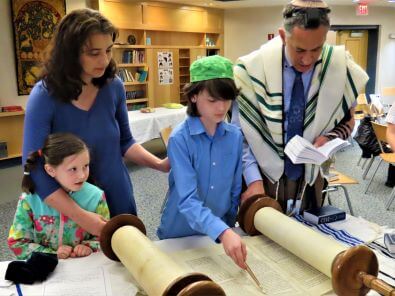 Our Nevatimfifth graders reached a tremendous milestone last week. After spending many hours with Rabbi Berger learning to identify and sing the notes of Torah trope, they diligently practiced to learn their Torah readings. The students emerged from this process able to chant Torah based on the building blocks of the Torah’s melodies, then taught themselves their verses; at no point did they receive a recording to memorize or sing along. Schechter students are poised with the genuine skills needed for a lifetime of reading Torah, and we are so excited for them to use these skills at their synagogues and camps in the future.
Our Nevatimfifth graders reached a tremendous milestone last week. After spending many hours with Rabbi Berger learning to identify and sing the notes of Torah trope, they diligently practiced to learn their Torah readings. The students emerged from this process able to chant Torah based on the building blocks of the Torah’s melodies, then taught themselves their verses; at no point did they receive a recording to memorize or sing along. Schechter students are poised with the genuine skills needed for a lifetime of reading Torah, and we are so excited for them to use these skills at their synagogues and camps in the future.
Click HEREto see photos of our fantastic Torah readers!
Anafim Writers Share their Passions in Books and Poetry
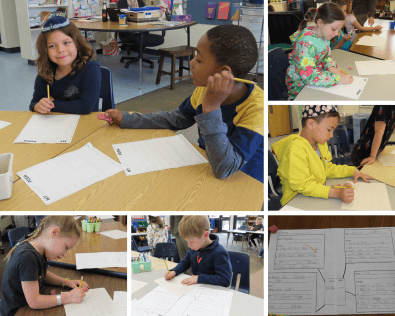 The Anafimstudents (grades 1-2) have been producing their final writing pieces of the year. The first-graders are writing non-fiction chapter books, which, when finished, will have four chapters! Each student chose a topic that they are passionate about in order to share their expertise, including Legos, snakes, chickens, nature, and dogs.
The Anafimstudents (grades 1-2) have been producing their final writing pieces of the year. The first-graders are writing non-fiction chapter books, which, when finished, will have four chapters! Each student chose a topic that they are passionate about in order to share their expertise, including Legos, snakes, chickens, nature, and dogs.
The second-graders have been studying different types of poetry and are in the process of composing their own poems. Their favorite form of poetry so far is the acrostic poem. Fun fact: did you know that a cinquain poem has five lines like the number five (cinco) in Spanish?
Camaraderie and Spirit Shine on Field Day
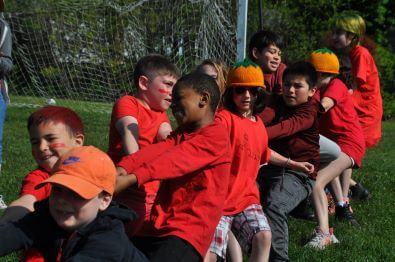 Tuesday’s Field Day was filled with positive energy, collaboration, student leadership, and school spirit! Students competed in tug-of-war, relay races, and a fantastic series of The Amazing Races (obstacles, sponge relay, wheelbarrow, sack races, and more). The Early Childhood students also had a blast participating in their own age-appropriate versions of the games. Kol hakavod to Coach Kee, the 8th grade team leaders, and all the students!
Tuesday’s Field Day was filled with positive energy, collaboration, student leadership, and school spirit! Students competed in tug-of-war, relay races, and a fantastic series of The Amazing Races (obstacles, sponge relay, wheelbarrow, sack races, and more). The Early Childhood students also had a blast participating in their own age-appropriate versions of the games. Kol hakavod to Coach Kee, the 8th grade team leaders, and all the students!
Click HEREto see Field Day photos!
Parashat Behar: Recognizing Change
 One of my favorite stories in the Talmud is about a highway robber who became a rabbi. In the end, tragically, he realizes that while he has indeed changed, his colleagues still see him as “the guy who used to be a bandit.” He then dies, apparently of a broken heart.
One of my favorite stories in the Talmud is about a highway robber who became a rabbi. In the end, tragically, he realizes that while he has indeed changed, his colleagues still see him as “the guy who used to be a bandit.” He then dies, apparently of a broken heart.
When I teach this story to students, I ask them if they’ve ever tried to change. I always get amazing answers: “When I was younger, like in 3rd or 4th grade, I was a troublemaker. Now, I behave a lot better.” “I used to be really mean to other girls, but in 7th grade, I realized what I was like, and I stopped.” “I used to be the shyest person in the class until 6th grade—that’s when I started to talk.” Every answer is moving and inspiring.
Then, I ask a follow-up question: How did your friends react? Their answers reveal something about a major challenge of trying to grow and change: “Even though I’m better in class, people still think I’m the class clown.” “People say mean things to me about others, and don’t understand that I don’t want to hear it.” “It took my friends two years to realize that I wasn’t shy anymore.” The point is clear: it’s hard enough to change, but it’s even harder when people close their eyes to the changes. And the other side of this coin: all too often, we are blind to the efforts of our friends, loved ones, and children to grow and develop.
A verse in this week’s parashah reads, lo tonu ish et amito , “Do not wrong one another” (Lev. 25:17). What kind of “wronging” is forbidden? The rabbis explain that it refers to ona’at devarim, “wronging with words.” If a person has turned his or her life around, say the rabbis, don’t keep reminding him, “I knew you before!” Such reminders can break the hearts and shatter the dreams of those who are proud of the way they’ve changed.
Spring is a time of growth. Our children are no longer the same as they were in September! They have blossomed over the course of the year, both through the education they’ve received, and through the social experiences they’ve had with friends and classmates. As our school year draws closer to its finish, may our eyes be open to all the wonderful changes that have taken place, so that we can see people as they are, not as they once were.
Shabbat shalom,
Rabbi Jonathan Berger
Head of School
Questions for the Shabbat table:
1. When we tell someone, “I remember how you used to be,” we are telling the truth—but the rabbis still say it’s wrong. How could it be wrong to tell the truth?
2. Have you ever tried to change? Were people able to see you differently?
Solomon Schechter Day School
of Greater Hartford
26 Buena Vista Road
West Hartford, CT 06107
© Solomon Schechter Day School of Greater Hartford | Site design Knowles Kreative

